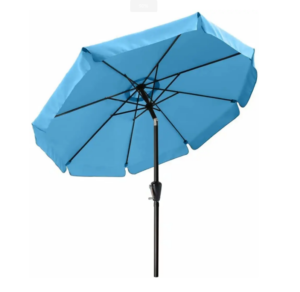
When it comes to choosing the perfect outdoor umbrella, one option that often stands out for its aesthetic appeal and timeless design is the wooden umbrella. Wooden umbrellas, commonly used in patios, gardens, and commercial spaces, are popular for their natural beauty and classic charm. But beyond their appearance, many people wonder: are wooden umbrellas actually good in terms of durability, functionality, and overall value? This article explores the benefits and drawbacks of wooden umbrellas, helping you determine if they’re the right choice for your outdoor space.
One of the biggest advantages of wooden umbrellas is their aesthetic appeal. Wooden frames offer a classic, elegant look that complements both modern and traditional outdoor settings. Whether you’re outfitting a garden, patio, or poolside area, a wooden umbrella can add a touch of natural beauty that enhances the overall atmosphere.
Why is this important? If you value style and appearance, wooden umbrellas can be a great option. The natural wood grain brings warmth and texture to outdoor spaces, making them visually appealing. For commercial settings like cafes and restaurants, wooden umbrellas can create a welcoming, sophisticated ambiance that attracts customers.
While wooden umbrellas are beautiful, how do they hold up in terms of durability? The answer largely depends on the type of wood used. High-quality wooden umbrellas are typically made from hardwoods such as teak, eucalyptus, or ash, which are known for their strength and resistance to outdoor conditions.
Teak is one of the most popular choices due to its natural oils that repel water and resist rot, making it highly durable for outdoor use. Eucalyptus is another excellent option, offering strength and weather resistance at a more affordable price point.
Why is this important? Durability is crucial for outdoor furniture and accessories. Wooden umbrellas made from quality hardwoods are capable of withstanding years of use in various weather conditions, including sun, rain, and wind. However, lower-quality woods may not offer the same longevity, so it’s important to consider the material when purchasing a wooden umbrella.
Wooden umbrellas can hold up well in different weather conditions if they are made from the right materials and properly maintained. Teak, for instance, naturally withstands moisture, resisting warping and rotting, while eucalyptus also offers good weather resistance when treated.
However, wood is still a natural material, meaning it will require maintenance over time. Exposure to sun and rain can eventually cause fading, splitting, or warping, especially in lower-quality wood.
Why is this important? Weather resistance is a major factor when selecting an outdoor umbrella. Wooden umbrellas can perform well in varying conditions, but they will likely need more upkeep than metal or fiberglass umbrellas to maintain their appearance and structural integrity.
Compared to umbrellas made from aluminum or fiberglass, wooden umbrellas require more maintenance to keep them looking and performing their best. This is particularly true if you want to preserve the rich, natural color of the wood. Regular cleaning and occasional refinishing are essential for preventing wear and tear.
Teak umbrellas, for example, may develop a natural silver-gray patina over time if left untreated. While some people enjoy this weathered look, others prefer to apply teak oil or sealants to retain the wood’s original golden hue.
Why is this important? Maintenance can be time-consuming, and not everyone has the time or desire to care for their outdoor furniture. If you’re looking for a low-maintenance option, a wooden umbrella may require more effort compared to other materials like aluminum or plastic. However, with proper care, a well-made wooden umbrella can last for many years and continue to enhance the beauty of your outdoor space.
Wooden umbrellas tend to be more expensive than their aluminum or plastic counterparts, especially when made from premium hardwoods like teak. The price reflects the quality of the materials and the craftsmanship involved in creating these umbrellas.
While the initial investment may be higher, the long-term value of a wooden umbrella can justify the cost. With proper care, a high-quality wooden umbrella can last for years, providing both functional shade and aesthetic appeal for your outdoor space.
Why is this important? Cost is always a consideration when purchasing outdoor furniture. If you’re willing to invest in a higher-quality product that offers durability and style, a wooden umbrella can be a worthwhile investment. However, for those on a tighter budget, other materials like aluminum may offer a more affordable solution.
So, are wooden umbrellas good? The answer largely depends on your specific needs and preferences. Wooden umbrellas offer a timeless aesthetic, strong durability (when made from high-quality hardwoods), and eco-friendly benefits, making them an excellent choice for many outdoor spaces. However, they do require more maintenance and can come with a higher price tag compared to umbrellas made from synthetic materials.
If you prioritize style, natural beauty, and are willing to invest in regular upkeep, a wooden umbrella can be a fantastic addition to your patio, garden, or commercial space. With proper care, it will not only provide shade but also elevate the look and feel of your outdoor environment for years to come.